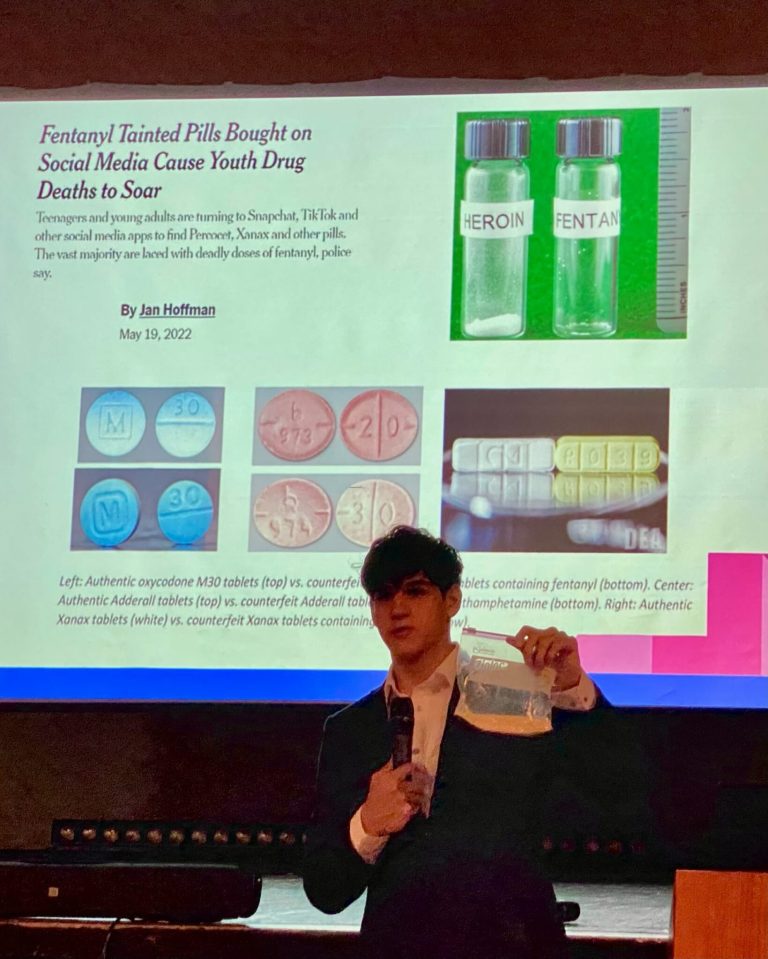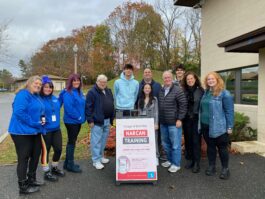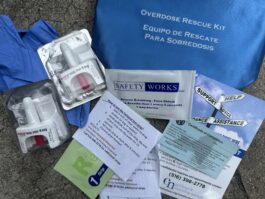
Roslyn High School junior Alex Rubin helped save another student’s life from a potential overdose at a party. Using his lifeguard training and what his dad referred to as common sense, Alex Rubin was able to provide her with medical attention and called for paramedics who administered Narcan, a life-saving overdose reversal drug, and transported her to the hospital.
Now he’s continuing to save lives by working with his dad, Edward Rubin, and partnering with Central Nassau Guidance and Counseling Services to provide overdose prevention information sessions and Narcan training to the North Shore.
Alex Rubin said he approached the unresponsive girl at the party to make sure she had a pulse and was breathing.
“She was, thank God,” he said.
As he was surrounded by some 50 high school kids trying to tell him what to do so that he would not call the police or first responders to avoid trouble, Alex Rubin refused to listen and instead chose to go with what he knew was right.
The high school student said she was admitted to the hospital and recovered – a fortunate ending.
But that wasn’t true for their family friend, who unexpectedly died of an overdose.
Alex Rubin said the friend was just like any other high-achieving college student. While his death was tragic, Alex Rubin said it was unfortunately not a unique circumstance.
At a March 20 press conference, County Executive Bruce Blakeman said 270 overdose-related deaths were reported in Nassau County in 2021. Of those deaths, 190 were due to fentanyl.
The father and son started their program in November, but Alex Rubin said they had been brainstorming the idea since the beginning of 2022 in the wake of their family friend’s death.

Edward Rubin said their purpose is to educate teenagers, their families and the broader community about the risk of fentanyl-laced substances and drug overdoses, combining it with comprehensive Narcan training to reverse an overdose if it does happen.
The father-son team with Kathie Lombardi, the outreach coordinator for the guidance and counseling center, have offered overdose prevention talks at the East Hills park, Temple Beth Shalom, two at Roslyn High School and at Paul D. Schreiber High School. Their next session will be at the Shelter Rock Public Library on May 11.
During their talks, each person represents a different aspect of the community and the issue at hand. Alex Rubin shares the statistics and the insight of teenagers experimenting with drugs, Edward Rubin utilizes his pharmacological background to share the medical aspects and Lombardi provides the formal Narcan training and shares her experience as a former drug user.
Attendees are provided overdose prevention kits, which include two doses of Narcan and fentanyl test strips. Similar kits have also been implemented in about 50 Nassau County buildings for use in emergencies.
Alex Rubin said it is important to include two doses of Narcan in case administering the first dose does not work. The kit also includes a card to present at a pharmacy for Narcan refills, which informs a pharmacist that you are trained to administer it.

Edward Rubin said one of the key aspects of their educational presentations is that people cannot be guaranteed that illegal drugs they purchase are not laced with fentanyl. This is why the fentanyl test strips are important.
He said the community is not facing an issue where teenagers are seeking out fentanyl, but rather are buying recreational drugs illegally, like Xanax and oxycodone, that can be laced with the highly fatal substance.
Alex Rubin said a common misconception is that Narcan will encourage teenagers to use drugs as they will now have a “magic, fix-it-all” treatment for overdoses, but he stressed that this is an emergency drug intended to prevent overdose deaths.
His father said parents commonly ask about this during their seminars, wondering if this will greenlight drugs for their children. But he assures them that the intent is to educate people on the risks of drug experimentation while still having resources in the case of an emergency.
Edward Rubin compared Narcan and overdose prevention training to providing teenagers with condoms, a historically criticized act for potentially promoting underage sex.
It’s a fact of life that teenagers are going to experiment sexually and drug experimentation is also a reality. Rather than take the abstinence approach to overdose prevention, the father and son are approaching it like condoms to prevent any harmful or fatal outcomes.
Just as condoms have become normalized despite negative pushback, Edward Rubin said Narcan can be treated the same way.
Edward Rubin said fentanyl, a drug commonly used in operating rooms by anesthesiologists, is not inherently an evil drug, but it is the uncontrolled and uninformed use that leads to deaths.
As an owner and operator of a surgery center in Garden City, Edward Rubin said purchasing fentanyl is fairly inexpensive. He said this is why it is so commonly used in illegal settings as well.
Edward Rubin said that fentanyl slows a person’s breathing down to a point where their oxygen levels drop and they become unconscious. He stressed that Narcan is a short-term fix to get someone breathing again after an overdose and to provide more time for the person to receive medical care.
“Our community has been fairly lucky in that we haven’t had a lot of these situations arise,” the elder Rubin said. “But now that there’s a lot of fentanyl being laced into products, it’s a matter of time before some kid who thinks they’re experimenting with a little Xanax ends up getting a dose of fentanyl. It’s about getting ahead and trying to prevent a tragedy.”







Great article. Very well written and interesting.
Grateful to the Rubin’s for sharing their knowledge with us and CN Guidance for the training.